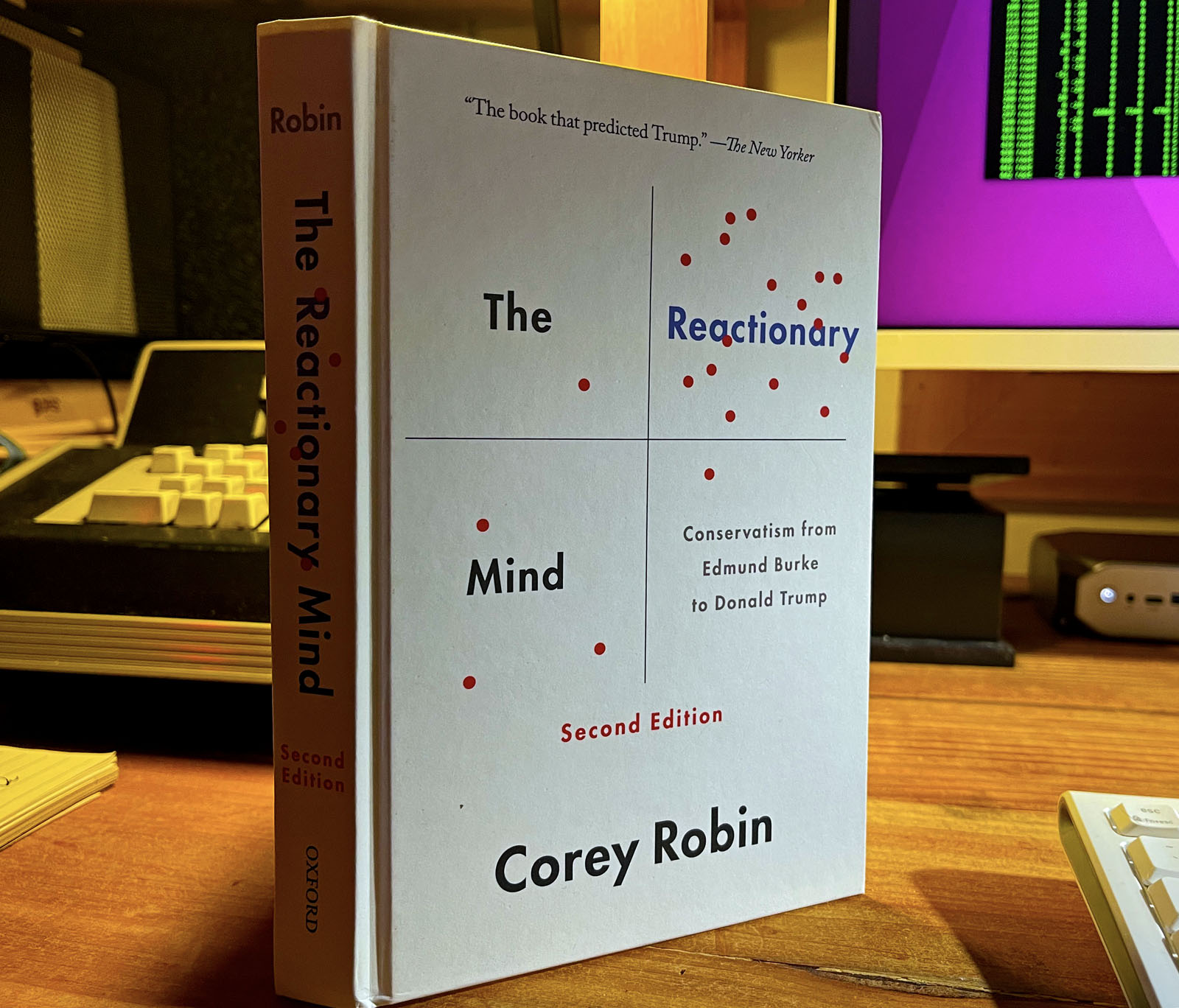
The Reactionary Mind: Conservatism from Edmund Burke to Donald Trump. Corey Robin. Oxford University Press, second edition, 2018.
The last chapter of this book — written, I believe, in 2017 — is about Donald Trump. Corey Robin quotes Tony Schwartz, who was the ghostwriter for Trump’s The Art of the Deal:
“I put lipstick on a pig,” he told The New Yorker in the summer of 2016. “I feel a deep sense of remorse that I contributed to presenting Trump in a way that brought him wider attention and make him more appealing than he is.” Schwartz’s disavowal is perplexing, though. The Art of the Deal is not a flattering or even outsized portrait of Trump. It’s a devastating — if unintentional — deflation of not only Trump the man but also the movement, party, and nation he now leads.”
This book is densely academic, but it’s not wishy-washy. I need to be careful here to distinguish between what I think about conservative intellectual discourse and what Corey Robin as an academic has to say about it. So this is me talking: Conservative discourse for 200 years, from Edmund Burke to Donald Trump, has all been lipstick on pigs, no matter how high-flown it might be. My claim has a simple basis though it has taken me decades, as a liberal, to see it clearly. That is that no justification exists, not on this planet or on any planet in the galaxy, for the perpetuation of systems that sustain the hierarchy of domination and subordination.
Robin starts with Edmund Burke, 1729-1797, an opponent of democracy who expressed great sympathy for Marie Antoinette but who didn’t care a fig for the common people, whom he saw as dangerous without an aristocracy to manage them. From Burke, Robin works his way forward chronologically — Nietzsche, Hobbes, Hayek, Oakeshott, Goldwater, Ayn Rand, Donald Trump.
The conservative derp of, say, William F. Buckley or Bill Kristol, is no longer in the papers. But we still have conservative producers of high-flown derp such as George Will, Thomas Sowell, and Ross Douthat. Douthat is occasionally capable of making a valid point when he is not blinded by his religion. But my claim is that all conservative discourse, whether old or new, if you decompile it, contains an intentional deception, some form of self-deception, some form of fallacy, or some kind of deformity of character, simply because it tries to justify the unjustifiable. I also claim that Robin’s academic analysis supports my non-academic claim. There is always something uncaring and mean in the conservative character. One of the achievements of the Trump era was to make this meanness a public virtue and to make the supposedly Christian virtues of caring, fairness, and help for the poor and weak — now called “wokeness” — an existential threat to be beaten back and beaten down.
Keeping in mind that this book was written in 2017, Robin sees the conservative movement in a state of decline:
“In recent years, the fusion of elitism and populism has grown brittle. Movement elites no longer find in the electoral majority such a wide or ready response to their populist calls. Like many movements struggling to hold onto power, conservative activists and leaders compensate for their dwindling support in the population by doubling down on their program, issuing ever more strident and racist calls for a return to a white, Christian, free-market nation…. Unable to fund its project on the basis of the masses, at least not nearly to the extent it once did, the right increasingly relies on the most anti-democratic elements of the state: not merely the Electoral College and the Supreme Court but also restrictions on the vote.”
This book is about how conservatives use ideas. A bigger concern, which lies outside the scope of this book, is how conservatives use power, when they can get it. Conservative ideas, no matter how much lipstick, are always mean and ugly. But even more ugly is the conservative desperation to hold onto the power to dominate, so recently on display at Trump rallies or the attack on the U.S. Capitol. The conservative mind can’t see the difference between the attack on the U.S. Capitol and a BLM protest that got out of hand. Here’s the difference that I see. It’s the difference between domination and subjugation, and the refusal to be dominated and subjugated. One wants to illegally install a vile and foul-mouthed oligarch in the most powerful office in the world. The other wants justice for the murder of powerless people. That difference is as wide as the galaxy, and there is something badly wrong with a mind that can’t see the difference.
Update: Thomas Edsall’s column in today’s New York Times is about psychopathy in today’s right-wing politics: “You Don’t Negotiate with These Kinds of People”













